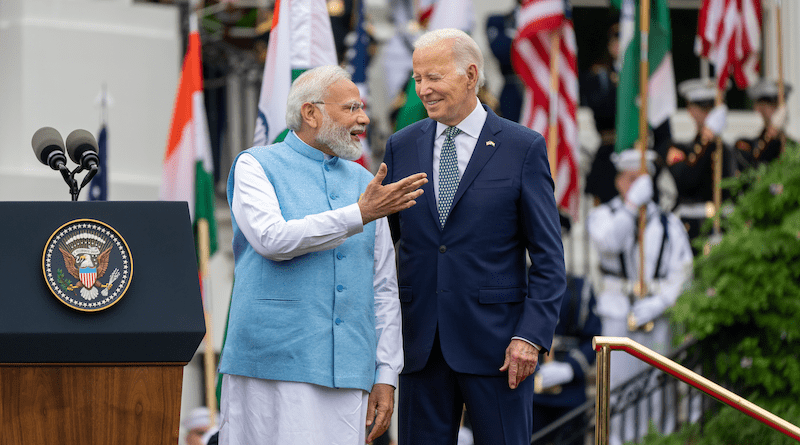Modi Muzzles Up! Why India’s Leaders Won’t Blast Biden’s ‘Xenophobic’ Slur? – OpEd
In an era where diplomatic exchanges are increasingly conducted in the public eye, the conspicuous silence from India’s Prime Minister Narendra Modi and Foreign Minister Subrahmanyam Jaishankar in response to US President Joe Biden’s recent “xenophobic” remark about India has raised international eyebrows. This silence is not merely a diplomatic choice; it’s a strategic and calculated move shaped by a complex web of political, economic, and social factors. What drives this silence, and what does it reveal about India’s current political landscape?
The Political Calculus Behind the Silence
At the heart of Modi and Jaishankar’s silence is a strategic calculation about the nature of India’s relationship with the United States. The US is not only a significant trade partner but also a crucial ally in the geopolitical chessboard of the Indo-Pacific region. Escalating a diplomatic spat with the US over Biden’s remarks could jeopardize vital collaborations in defence, technology, and trade.
Moreover, the Modi administration is acutely aware of the broader geopolitical dynamics. The US’s Indo-Pacific strategy seeks to counterbalance China’s rising influence, and India plays a pivotal role in this framework. A public confrontation with the US might weaken this strategic partnership, which is essential for countering regional threats and fostering economic growth.
Domestic Political Considerations
Domestically, the Modi government faces a delicate balancing act. India is a diverse nation with a complex social fabric, and issues related to minority rights and social cohesion are politically sensitive. Addressing Biden’s “xenophobic” slur directly could amplify domestic criticisms regarding the government’s handling of minority issues, particularly those concerning the Muslim community. The Citizenship Amendment Act (CAA) and the revocation of Jammu and Kashmir’s special status have already attracted significant domestic and international scrutiny.
Modi’s Bharatiya Janata Party (BJP) has built its political brand on a platform of nationalism and Hindu pride. Confronting Biden’s remarks might alienate the BJP’s core supporters, who view external criticism as interference in India’s sovereign affairs. The government’s silence can thus be seen as an attempt to avoid fuelling domestic unrest and to maintain political stability ahead of upcoming elections.
Economic Implications
Economic considerations also play a crucial role in the government’s response—or lack thereof. The economic relationship between India and the US is multifaceted, encompassing trade, investment, and technology transfer. Diplomatic tensions could adversely affect these economic ties, complicating efforts to attract foreign investment and technology partnerships critical for India’s development goals.
The Modi administration is keenly aware of the economic challenges posed by the global pandemic. Maintaining a stable and positive relationship with the US is vital for economic recovery and growth. By avoiding a public spat, the government aims to protect economic interests that are paramount for national development.
The Human Rights Dimension
Biden’s remarks about xenophobia are not made in a vacuum. They reflect growing international concern over India’s human rights record, particularly in relation to its treatment of minorities. Reports from human rights organizations have highlighted instances of discrimination and violence against Muslims, drawing global attention and criticism.
The Modi government’s silence can thus be interpreted as an attempt to manage India’s international image. Engaging in a public confrontation over human rights issues could further damage India’s reputation, making it harder to engage diplomatically on other fronts. By maintaining silence, the government might hope to avoid drawing additional international scrutiny and to manage the narrative more effectively behind closed doors.
Domestic Human Rights and Social Cohesion
Internally, the issue of human rights is deeply intertwined with social cohesion. India’s diverse population includes multiple religious, ethnic, and cultural groups, each with its own distinct identity and concerns. The government’s policies and rhetoric have significant implications for social harmony and national unity.
Addressing Biden’s criticism head-on could risk inflaming domestic tensions and undermining efforts to promote social cohesion. The Modi administration’s silence might be a strategic choice to keep a lid on potential unrest and to focus on unifying messages that resonate with the broader population.
The Broader Implications of Silence
Joseph Nye’s concept of soft power emphasizes the importance of attraction and persuasion in international relations. India has historically leveraged its cultural diversity, democratic values, and vibrant diaspora to project soft power globally. However, recent policies and international criticisms have strained this soft power.
The government’s silence on Biden’s remarks could be seen as a missed opportunity to engage constructively and to reaffirm India’s commitment to democratic principles and human rights. By not addressing the issue, India risks further eroding its soft power and diminishing its influence on the global stage.
The silence from India’s leaders also sets a precedent for how the country might navigate future diplomatic challenges. In an increasingly interconnected world, issues related to human rights and social justice are gaining prominence. How India addresses these issues, both domestically and internationally, will shape its global standing and its ability to influence international norms and policies.
A Calculated Silence
In sum, the silence of Prime Minister Narendra Modi and Foreign Minister Subrahmanyam Jaishankar in response to President Biden’s “xenophobic” slur is a calculated diplomatic strategy influenced by a complex interplay of political, economic, and social factors. This silence reflects a broader approach to managing both international relations and domestic political dynamics. While it may offer short-term stability, the long-term implications for India’s soft power and global influence remain uncertain. As India continues to navigate these challenging waters, the government’s ability to balance strategic diplomacy with a commitment to democratic values and human rights will be crucial for shaping its future trajectory on the world stage.

